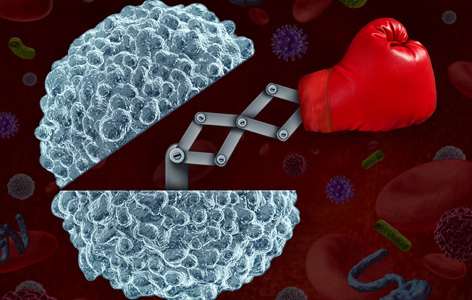Home page Description:
Previously uncharacterized immune cells may inhibit the immune system from attacking cancer.
Posted On: February 24, 2017

Image Caption:
Tumour-infiltrating lymphocytes are white blood cells that have migrated from the blood into a tumour, and are implicated in tumour destruction.
Immune therapy is an emerging treatment option for cancer. It works by boosting the number and activity of tumour-infiltrating lymphocytes (TILs), which are immune cells that target and destroy tumour cells. Despite the treatment’s powerful effects, however, not all people respond to immune therapy.
To learn more about these cells in ovarian cancer, PM Senior Scientist Dr. Pamela Ohashi and her research team grew TILs from ovarian tumours. The team found that healthy TILs from certain tumours could not be grown and noted that these tumours contained a previously undefined subset of immune cells. After isolating and characterizing these cells, the researchers found that the cells suppress the growth of cancer-fighting TILs, possibly preventing the immune system from mounting an effective response against tumours. The cells inhibited TILs in two ways: they reduced the growth and expansion of TILs, and blocked their ability to produce soluble factors that promote immune responses.
"By looking at tumour biology from this different perspective, we'll have a better understanding of the barriers that prevent a strong immune response," says Dr. Ohashi. "This can help advance drug development to target the bad cells." She further explains that one such approach may be to develop combined therapies that simultaneously target and kill the suppressive immune cells while promoting TIL growth and function.
Building on these findings, the research team will now work towards developing a test to identify these cells in patients, which may help predict whether the patient will respond to immune therapy. "This knowledge would inform clinical decisions, personalize cancer treatment and ultimately improve the effectiveness of immune therapy approaches," says Dr. Ohashi.
Watch this video to learn more about Dr. Ohashi’s research.
This work was supported by the Canadian Institutes of Health Research, the Cancer Research Institute/Irvington Institute, the Canada Foundation for Innovation, the Ontario Ministry of Research, Innovation and Science, the Alexander von Humboldt Foundation, the German Research Council, the National Institutes of Health, the Parker Institute for Cancer Immunotherapy and The Princess Margaret Cancer Foundation. P Ohashi is a Tier 1 Canada Research Chair in Autoimmunity and Tumour Immunity.
Crome SQ, Nguyen LT, Lopez-Verges S, Yang SY, Martin B, Yam JY, Johnson DJ, Nie J, Pniak M, Yen PH, Milea A, Sowamber R, Katz SR, Bernardini MQ, Clarke BA, Shaw PA, Lang PA, Berman HK, Pugh TJ, Lanier LL, Ohashi PS. A distinct innate lymphoid cell population regulates tumor-associated T cells. Nature Medicine. 2017 Feb. doi: 10.1038/nm.4278.
To learn more about these cells in ovarian cancer, PM Senior Scientist Dr. Pamela Ohashi and her research team grew TILs from ovarian tumours. The team found that healthy TILs from certain tumours could not be grown and noted that these tumours contained a previously undefined subset of immune cells. After isolating and characterizing these cells, the researchers found that the cells suppress the growth of cancer-fighting TILs, possibly preventing the immune system from mounting an effective response against tumours. The cells inhibited TILs in two ways: they reduced the growth and expansion of TILs, and blocked their ability to produce soluble factors that promote immune responses.
"By looking at tumour biology from this different perspective, we'll have a better understanding of the barriers that prevent a strong immune response," says Dr. Ohashi. "This can help advance drug development to target the bad cells." She further explains that one such approach may be to develop combined therapies that simultaneously target and kill the suppressive immune cells while promoting TIL growth and function.
Building on these findings, the research team will now work towards developing a test to identify these cells in patients, which may help predict whether the patient will respond to immune therapy. "This knowledge would inform clinical decisions, personalize cancer treatment and ultimately improve the effectiveness of immune therapy approaches," says Dr. Ohashi.
Watch this video to learn more about Dr. Ohashi’s research.
This work was supported by the Canadian Institutes of Health Research, the Cancer Research Institute/Irvington Institute, the Canada Foundation for Innovation, the Ontario Ministry of Research, Innovation and Science, the Alexander von Humboldt Foundation, the German Research Council, the National Institutes of Health, the Parker Institute for Cancer Immunotherapy and The Princess Margaret Cancer Foundation. P Ohashi is a Tier 1 Canada Research Chair in Autoimmunity and Tumour Immunity.
Crome SQ, Nguyen LT, Lopez-Verges S, Yang SY, Martin B, Yam JY, Johnson DJ, Nie J, Pniak M, Yen PH, Milea A, Sowamber R, Katz SR, Bernardini MQ, Clarke BA, Shaw PA, Lang PA, Berman HK, Pugh TJ, Lanier LL, Ohashi PS. A distinct innate lymphoid cell population regulates tumor-associated T cells. Nature Medicine. 2017 Feb. doi: 10.1038/nm.4278.




